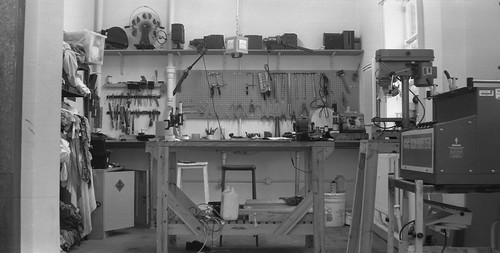 |
| Kodak No.2A Brownie with Ilford HP5 Plus |
For yesterday's '
Take Your Box Camera To Work Day', I used my Kodak No.2 Brownie; having shot with it for last June's
116 Day, I was keen to use it again, but hadn't had the excuse. Keeping the 116 backing paper from the two Kodacolor 116 films that I had used last year, it was a simple matter to transfer 120 film to the slightly larger paper. The original 116 film is longer than 120, with the result of getting just six whole images from a roll, but I had no problems with frame spacing, as I did have when using 120 film with adaptors, as the numbers and markings do not quite evenly match up; although I did get six
whole images, most of a seventh image was possible, but with the odd effect of the very end of the film curling up inside the camera and creating an odd oblique shadow on itself with distortion in one corner, as the narrow width of 120 film meant that it wasn't securely held each side of the frame (this did also show up as a slight curl at the top or bottom - or both - of most images).
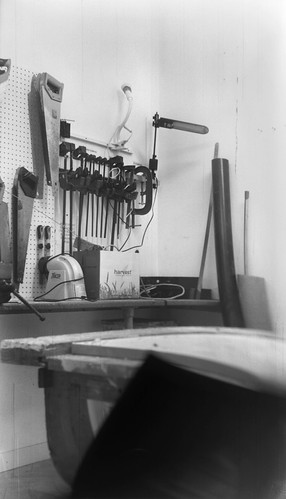 |
| Kodak No.2A Brownie with HP5 Plus - seventh frame |
I shot two rolls of
Ilford HP5 Plus with the 116 backing paper; most were long exposures with the 'time' setting, and at the camera's smallest aperture, finding level surfaces to place the camera for a few seconds, although I did attempt a few shots on the 'instant' setting, such as the one below, but with the Brownie's widest aperture being around f11, interior shots with a fixed shutter speed of around 1/40th would generally be underexposed; in addition, the weather for most of the day was overcast, providing less daylight to help illuminate rooms with windows.
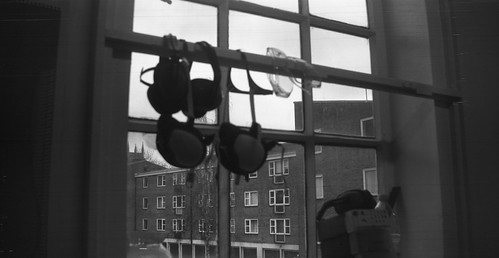 |
| Kodak No.2 A Brownie with Ilford HP5 Plus |
Despite having attempted to clean the rollers on the camera, the photographs shot with the Brownie did have scratches through the emulsion, although not generally as bad as the film I'd used last year. These scratches tended to show more on the instantaneous shots, as the negatives were thinner; the patterns of the scratches also suggested that, by virtue of how the Brownie's film advance works, each turn of the wind on key has points where the tension is greatest, and the scratches were more prominent, as seen in the image below.
 |
| Kodak No.2A Brownie with Ilford FP4 Plus |
As well as HP5 Plus, I also shot a roll of
Ilford FP4, using the spool adaptors I'd previously made, which worked well enough, as did the spacing generally, using the 6x4.5 frame markings on the back of 120 paper (which I have written about more fully in my post about the
Zeiss Ikon Cocarette). Probably the best shots from the day were two on FP4 Plus from my journey home, with the light failing, using relatively long exposures at f22, at the bottom of this post, which demonstrate how good the Brownie's lens can perform stopped down (the subjects of most of the other photographs are a little close for the fixed-focus lens). An additional synchronicity for using the No.2A Brownie on this year's 'Take Your Box Camera To Work Day' is that my particular model B version is one hundred years old this year: a couple of small details (specifically, the spool-end tension springs and the unmilled latches) are evidence that the camera was produced at some point between June and October 1917.
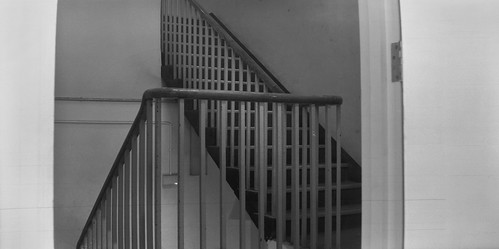 |
| Kodak No.2A Brownie with Ilford HP5 Plus |
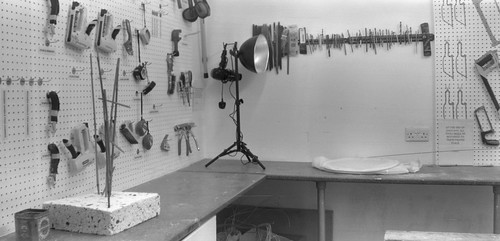 |
| Kodak No.2A Brownie with Ilford HP5 Plus |
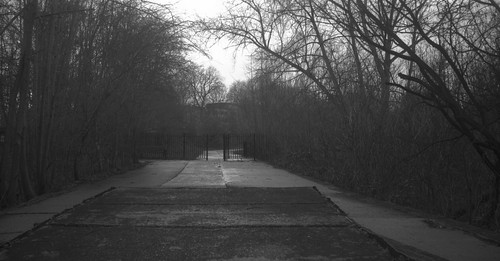 |
| Kodak No.2A Brownie with Ilford FP4 Plus |
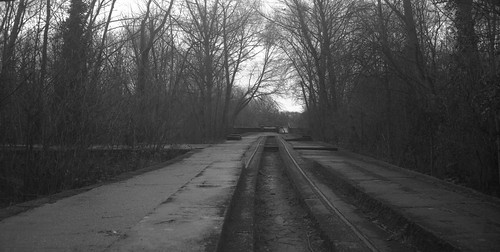 |
| Kodak No.2A Brownie with Ilford FP4 Plus |








No comments:
Post a Comment